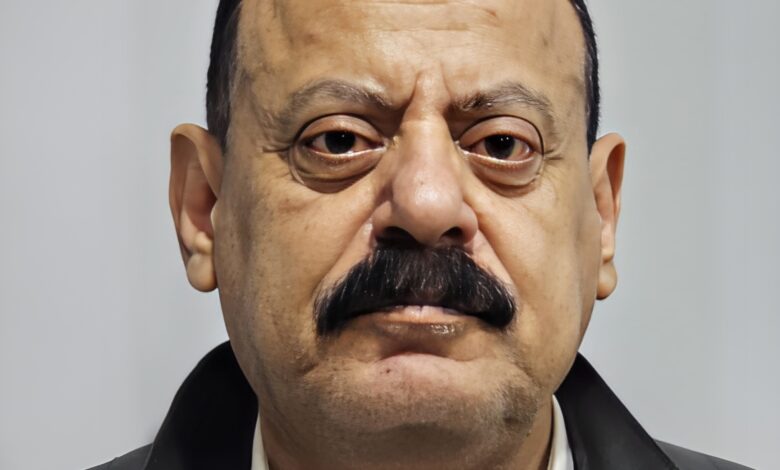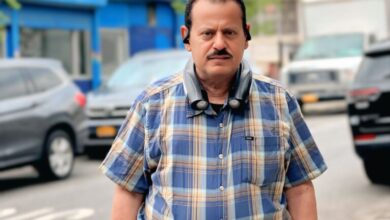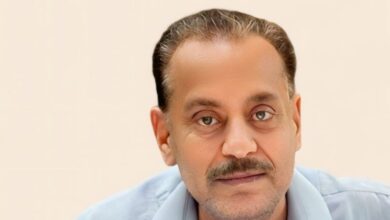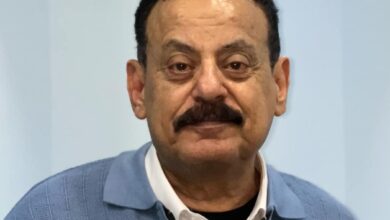Escape and Return

Yemenat
Ahmed Saif Hashed
I fled to the house of “Al-Shanaghib,” my grandfather’s home—my mother’s father. I think “Al-Shanaghib” derives from “Shanghab,” meaning a protrusion, and perhaps it refers to the peaks of the mountains behind the hill that hosts my grandfather’s house.
I cannot be certain, but it is an attempt to understand any possible relationship between this name and the jutting mountains behind it, or between the house itself, which seems to protrude at its peak, and the gradually rising mountains behind it, where the larger peaks support the smaller ones, creating a sequence of successive protrusions.
In this context, Abdulhafiz Abdullah Al-Qabati poetically observes:
The sun casts shadows on the back of Al-Shanaghib,
And magic pours forth, bringing delights to hearts.
My grandfather’s house is about five kilometers from my father’s home, situated near the borders of the southern state, which was once known as the “People’s Democratic Republic of Yemen.” Some details suggest that this house was once a military stronghold, perched atop one of the mountains and supported by larger and higher mountains, standing alone in its vicinity.
There are numerous houses scattered around it to the north and south, while below the mountain lies a valley called “Wadi Al-Sadr.”
Adjacent to the house is an underground water tank, and within the house are narrow openings and long, narrow slits that can be used for surveillance and firing a rifle outside. These allow for the rifle’s barrel to extend outward at a specific angle.
It seems this house has witnessed some of what it was meant for in a bygone era.
My mother lived in this house for a short time before I was born, and I spent brief periods there with her during my childhood whenever she sought refuge from my father.
I found comfort in this house and its inhabitants during my early years. In the same house, my younger brother Abdulkarim was born, a joyous occasion after a long wait for a brother following repeated disappointments. My grandfather, Salem Mani, my mother’s father, also owned another house called “Dar Mujir,” which is a short distance from “Jinn Al-Dajina” and about two kilometers from my father’s house.
This grandfather was a virtuous and peaceful man, known for his asceticism. He was kind-hearted and pure in soul, spending much of his daily time reading the Quran and discussing its interpretations, stories, and news.
He was devout and pious, loving, without malice or ill intent, and he paid little attention to politics. Nevertheless, he later paid for the actions of politicians—“nationalism” and “liberation”—the sheikhs of “Aliyan” and “Suflan.”
* * *
My father arrived, furious and enraged, an hour or so after my escape. I saw him from the house of “Al-Shanaghib” without him noticing me.
I was waiting for his arrival, and my intuition proved correct. I saw him riding his white donkey, which resembled a horse. He cared for it greatly.
As I watched him in the valley, I noticed his rifle laid across his lap, ready to be used the moment he spotted me.
At that moment, I felt malice and fire emanating from him. My mother, who had fled to my grandfather’s house, felt her heart clench for her son, who might be harmed by his father.
In that moment, I made my decision alone, without involving anyone.
It was made in a moment of distress and fear, driven by the feeling that my life was threatened by bullets or some terrifying unknown that awaited me. My primary motive was to escape whatever he might inflict upon me; the rest were mere details.
I rushed from the house toward the mountain. My direction was toward the borders of the southern state. Before me lay a rugged path, with accumulated mountains for which I had no known route.
Yet the fear that overwhelmed me was greater and more formidable than them. Perhaps my grandfather’s house would not save me from my plight. Maybe by fleeing south, I would find a state that could protect me from my father’s tyranny.
Perhaps I would find there a system that would safeguard me and curb my father’s madness. These were the thoughts I entertained that day.
Today, a question arises in my mind: Does today resemble yesterday? I answer: The south today is not what it once was. We no longer have remnants of a homeland. No place here, nor dignity there. No refuge here, nor refuge there.
We are left here and there without a constitution, law, state, system, security, or safety, and without a decent morsel of bread. All places have turned into hell, beginning here and extending there.
* * *
As I prepared to head to the borders via a rugged route I had never taken before, or even imagined, my aunt Mariam—my mother’s sister—informed my father that I had left the house and fled to the mountain. My aunt was strong-willed, firm, and resolute; she excelled in bravery, confrontation, provocation, and in reading the Book of “Sand” while deciphering its meanings.
My father understood my direction and hastened his donkey to the southwestern side of the valley, attempting to intercept my path toward the mountain and prevent me from crossing the first mountain toward the borders.
I saw him draw his rifle and aim it at the mountain where I was, so I hid behind a rocky outcrop as soon as I saw him trying to cut off my route.
After lengthy negotiations with my aunt Mariam and some good men passing by, my father committed not to harm me in exchange for my return to his house.
Perhaps my exaggerated feelings made me think that my father was intent on taking my life—a child seeking an opportunity to escape from his father. My aunt called me back, assuring me that no harm would come to me from him. Everyone reassured me that conditions would be gentle, if not perfectly fine, and that I would not face any misfortune.
After realizing my intention, my father promised in front of witnesses that he would not harm me or seek revenge; his only condition was that I return to his home. This seemed to me like a possible deal.
I descended from the mountain after what resembled a negotiation led by my aunt from my side, while my father returned, swallowing his fury, feeling dissatisfied because he had not satisfied his anger or quenched his boiling resentment.
I returned with a procession surrounding me; some women and my half-sister Hanan accompanied me back. We were about five hundred meters from my father and his donkey.
He waited for us at every turn as we drew closer.The distance began to shrink as we walked. When we reached an area called “Thursday Market,” it seemed that my father could no longer bear seeing me appear to him as an instigator of provocation. His anger flared at the sight of me looking victorious, and he became suspicious that I was mocking him and undermining his authority. Perhaps that was what crossed his mind as we followed the path, and he occasionally cast me empty looks devoid of warmth or kindness.
My father could not contain the turmoil in his chest that continued to boil, and suddenly his rage erupted. He muttered angry curses and pointed his rifle at me. The women shielded me with their bodies, and screams and panic filled the place. Bystanders and anyone nearby intervened, and the uproar ended when my father reluctantly made another pledge to the people that he would not harm me. This time he honored his promise, albeit with reluctance and bitterness.
Perhaps my father could not bear to witness what he perceived as my ongoing victory over him. To avoid breaking a promise he had made twice in front of witnesses, he returned me to our old house, which my brother Ali had inhabited, rather than to our new home where he lived.
A few days later, my father reconciled with my mother and her family, and then I returned to my father’s house once more, in the presence of my mother, who deeply regretted what had happened and for leaving me during those days when I needed her most by my side.
The holiday passed with fewer losses. It came with a difficult peace after I had imagined it might turn into a funeral or an unknown experience I could not fathom! I was the most significant reason for the continuation of my parents’ marriage, despite the numerous problems and challenges this difficult union faced, from which I miraculously emerged, perhaps akin to a miracle.
* * *






